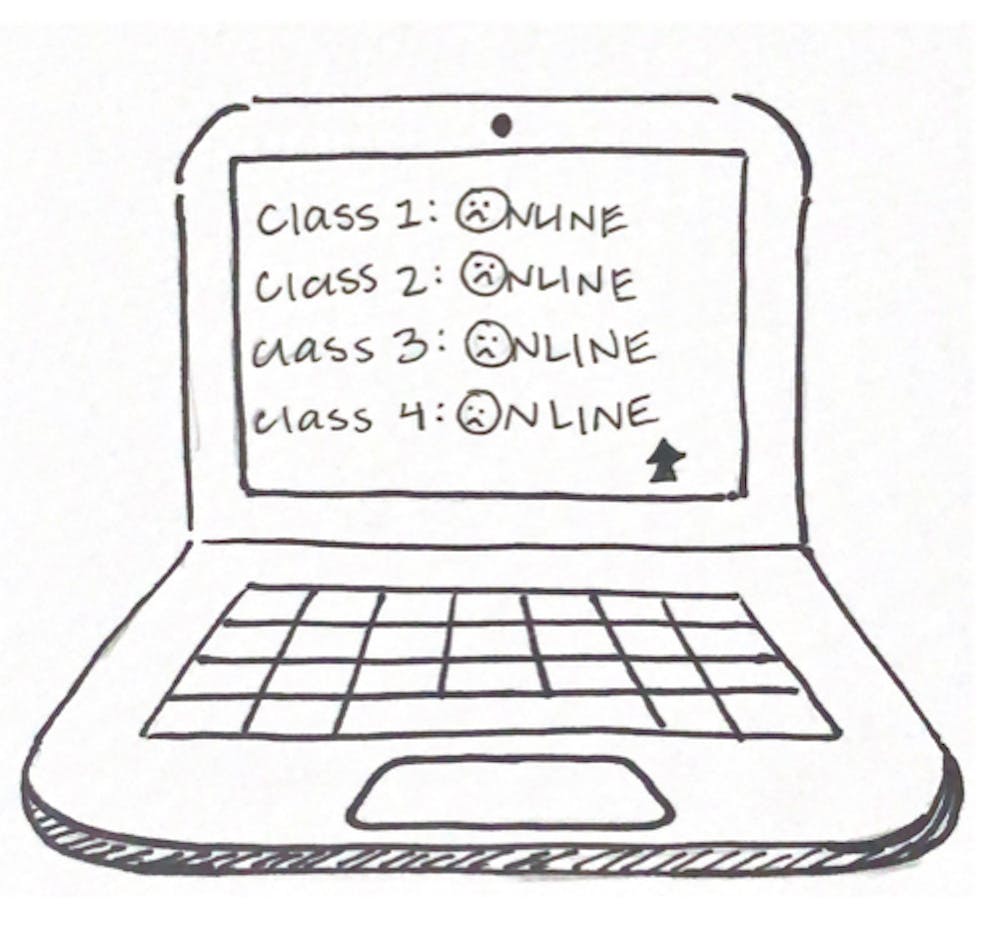This year, we’ve all made sacrifices necessary for a safe return to Middlebury. Faculty have spent their summers — typically reserved for research and downtime — reworking their syllabi, and students have committed to taking classes from their dorm rooms. These adjustments are commendable. However, the administrative rhetoric — that creative planning and a summer of preparation would result in online classes that would be academically and pedagogically up to par — has proven to be as untrue as many students anticipated.
For many of us, especially those who are taking multiple online classes, learning has felt more difficult. Attending classes over Zoom means that our bedrooms and classrooms have merged into one place, blurring the line between leisure and academic spaces and making it harder to focus in class. Those living in double rooms face additional challenges, as some students might have overlapping Zoom classes with their roommates. Restrictions around access to academic buildings and a lack of adequate study spaces only exacerbate these difficulties.
It’s also impossible to replicate the organic flow of traditional conversations in class discussions, as participants are forced to wait their turn to be called on to unmute themselves and make a point. Long silences and stilted discussions characterize many of our class meetings, and maintaining focus and active engagement through a screen often feels futile.
Gone are the days of lingering behind after class to chat with professors or to make lunch plans with classmates, engaging in witty rapport and sharing knowing glances — or even pencils — with people next to you. It’s these small gestures that we took for granted before that helped us facilitate bonds with our peers and professors, which has felt much harder to do this semester. For many of us, our “Zoommates” don’t exist beyond the boxes on our screen, and we are left yearning for more authentic social interactions — or any in-person interactions at all.
But it hasn’t been all bad. Many professors have implemented in-person components such as in-person office hours or assignments that involve going outside or interacting with people. Many have also made themselves more readily available for support, whether that be through additional office hours or staying behind to answer questions for a few minutes after Zoom class.
We want to express gratitude for the extensive work that professors put into creating online classes almost entirely from scratch and learning new technologies in order to do so. For many, holding in-person classes posed health and safety risks or became impossible in light of new Covid-19 restrictions or childcare responsibilities. Thus, teaching classes online — whether in an (a)synchronous, hyper-flexible, or blended mode — wasn’t a choice so much as a necessity.
Looking forward to the spring, we acknowledge that the realities of this ongoing pandemic will likely force many professors to continue to teach online. Despite these obstacles, more professors will be teaching in person, with double the amount of fully in-person classes, which we are grateful for.
However, more than half of the classes offered in the spring will still be taught fully online, and a significant majority will include online components — only 26% of classes will be fully in-person. Knowing what we know about the spring courses, we ask that professors who will be teaching online provide and expand upon the in-person components of their classes to the best of their capacity.
For professors, this may be a small blip in a long academic career, a year of online classes amid decades of teaching. But for undergraduate students who get just four years of instruction, two semesters spent taking many (or all) online classes can feel like a major detriment to learning and the academic experience as a whole. Small things make a difference, and we hope professors keep this in mind as we head toward another unconventional semester.
This editorial represents the opinions of the Middlebury Campus’s editorial board.
Remote classes aren’t the same

Comments


